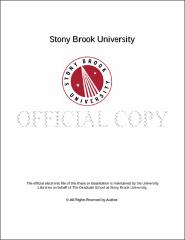| dc.identifier.uri | http://hdl.handle.net/11401/77635 | |
| dc.description.sponsorship | This work is sponsored by the Stony Brook University Graduate School in compliance with the requirements for completion of degree. | en_US |
| dc.format | Monograph | |
| dc.format.medium | Electronic Resource | en_US |
| dc.language.iso | en_US | |
| dc.publisher | The Graduate School, Stony Brook University: Stony Brook, NY. | |
| dc.type | Dissertation | |
| dcterms.abstract | <italic>Salmonella enterica</italic> serovar Typhimurium (<italic>S.</italic> Typhimurium) are pathogenic bacteria that suppress T cell responses to avoid clearance by the immune system, yet the mechanisms that mediate this immunosuppression remain largely unknown. Our laboratory previously showed that L-Asparaginase II produced by <italic>S.</italic> Typhimurium inhibits T cell responses and mediates virulence. The goal of my dissertation research was to determine the mechanism by which L-Asparaginase II produced by <italic>S.</italic> Typhimurium inhibits T cell responses. As described in my dissertation, I have found that L-Asparaginase II of <italic>S.</italic> Typhimurium exhibits L-asparagine hydrolysis activity and that this activity is required for the inhibition of T cells. Furthermore, I have found that exogenous L-asparagine is a resource important for T cell function and that L-Asparaginase II-mediated deprivation of exogenous L-asparagine inhibits T cell responses through suppression of metabolic reprogramming. The suppression of T cell metabolism was characterized by the inhibition of mTOR signaling, autophagy, c-Myc expression and new protein synthesis required for the activation, proliferation and differentiation of naïve T cells into effector T cells. These findings advance knowledge of a mechanism used by <italic>S.</italic> Typhimurium to delay onset of protective immune responses and thus have fundamental implications for understanding host interactions with bacterial pathogens. | |
| dcterms.abstract | <italic>Salmonella enterica</italic> serovar Typhimurium (<italic>S.</italic> Typhimurium) are pathogenic bacteria that suppress T cell responses to avoid clearance by the immune system, yet the mechanisms that mediate this immunosuppression remain largely unknown. Our laboratory previously showed that L-Asparaginase II produced by <italic>S.</italic> Typhimurium inhibits T cell responses and mediates virulence. The goal of my dissertation research was to determine the mechanism by which L-Asparaginase II produced by <italic>S.</italic> Typhimurium inhibits T cell responses. As described in my dissertation, I have found that L-Asparaginase II of <italic>S.</italic> Typhimurium exhibits L-asparagine hydrolysis activity and that this activity is required for the inhibition of T cells. Furthermore, I have found that exogenous L-asparagine is a resource important for T cell function and that L-Asparaginase II-mediated deprivation of exogenous L-asparagine inhibits T cell responses through suppression of metabolic reprogramming. The suppression of T cell metabolism was characterized by the inhibition of mTOR signaling, autophagy, c-Myc expression and new protein synthesis required for the activation, proliferation and differentiation of naïve T cells into effector T cells. These findings advance knowledge of a mechanism used by <italic>S.</italic> Typhimurium to delay onset of protective immune responses and thus have fundamental implications for understanding host interactions with bacterial pathogens. | |
| dcterms.available | 2017-09-20T16:53:07Z | |
| dcterms.contributor | Bliska, James | en_US |
| dcterms.contributor | van der Velden, Adrianus W.M. | en_US |
| dcterms.contributor | Zong, Wei-Xing | en_US |
| dcterms.contributor | Krug, Laurie | en_US |
| dcterms.contributor | Macian, Fernando. | en_US |
| dcterms.creator | Torres, AnnMarie | |
| dcterms.dateAccepted | 2017-09-20T16:53:07Z | |
| dcterms.dateSubmitted | 2017-09-20T16:53:07Z | |
| dcterms.description | Department of Genetics. | en_US |
| dcterms.extent | 139 pg. | en_US |
| dcterms.format | Application/PDF | en_US |
| dcterms.format | Monograph | |
| dcterms.identifier | http://hdl.handle.net/11401/77635 | |
| dcterms.issued | 2014-12-01 | |
| dcterms.language | en_US | |
| dcterms.provenance | Made available in DSpace on 2017-09-20T16:53:07Z (GMT). No. of bitstreams: 1
Torres_grad.sunysb_0771E_11720.pdf: 3056539 bytes, checksum: 17848ea29dc0fe24f205200934b63305 (MD5)
Previous issue date: 1 | en |
| dcterms.publisher | The Graduate School, Stony Brook University: Stony Brook, NY. | |
| dcterms.subject | Microbiology | |
| dcterms.title | L-Asparaginase II produced by S. Typhimurium inhibits T cell responses through hydrolysis of L-asparagine and suppression of metabolic reprogramming | |
| dcterms.type | Dissertation | |

